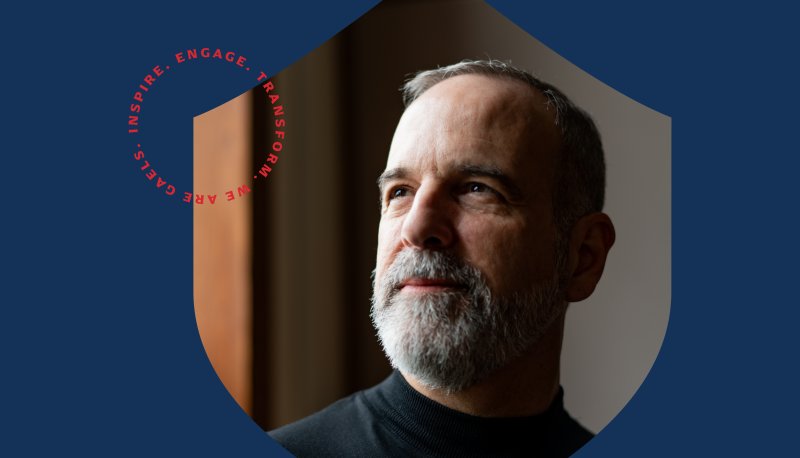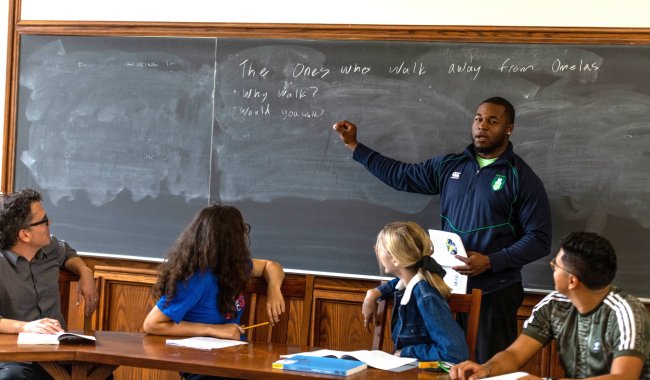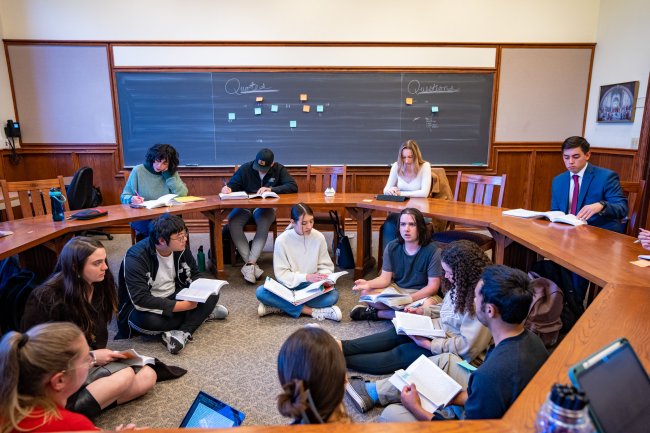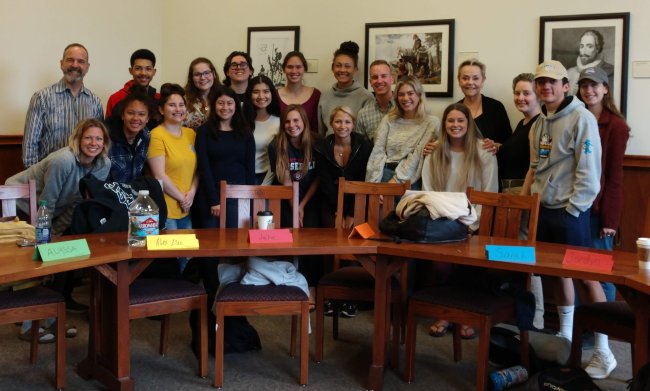
Professor of the Year José Feito / Photo by Francis Tatem
‘The Very Best of Us—And What We Aspire to Be’: José Feito is SMC’s Professor of the Year
This psychology teacher and scholar who learned to love learning as much as teaching reflects on a journey that began—and remains—right here at Saint Mary’s. On April 10, he’ll share what he’s discovered over the years.
Psychology professor José Feito is a rarity among college faculty members. Saint Mary’s has been his academic home for his entire career as a scholar and educator. That’s turned out to be a very good thing for a generation of SMC students, faculty members, and the College’s renowned Collegiate Seminar program.
In fact, Feito came to Saint Mary’s directly from his doctoral program at UC Berkeley—never applying anywhere else. Now, with nearly 30 years of teaching, research, and scholarship under his belt, Feito is being recognized as Saint Mary’s Professor of the Year for 2023–24. “With our fervent commitment as a Catholic, Lasallian, and liberal arts college to focus on equity and inclusion, especially in light of national and global events, there is no better professor who represents the very best of us, and what we aspire to be,” wrote his nominators.
On Friday, April 10, the SMC campus community is invited to attend a presentation from Feito, “Intimate Encounters and the Potential of Deep Relating,” to help honor and celebrate his achievements. RSVPs are strongly encouraged.
Enduring impact on Collegiate Seminar
As someone with a self-described “introspective bent,” Feito initially came to Saint Mary’s after learning about its innovative Collegiate Seminar—a signature program for which he would ultimately serve as director for two terms. Through his leadership, Feito helped reshape how Seminar is conducted.
Historically, discussions around Seminar centered on the reading list, including debates around whether modern texts were more culturally relevant to students than classic works from the Western canon. One startlingly simple solution that Feito introduced into the first-year Collegiate Seminar curriculum was the pairing of older works with more modern readings.
Citing just one of many examples, he put in place a new reading list that coupled the Allegory of the Cave from Plato’s Republic and Ursula K. Le Guin’s 1973 short story, “The Ones Who Walk Away From Omelas.” Though written centuries apart, Feito says both works consider the responsibilities of those who see through illusion and injustice. “This immediately created more energy around first-year Seminar,” he says.

But even more than the program’s content and books, Feito says he’s most proud of the impact he’s had on the Seminar process.
“Though I certainly had to wade into content matters, I was much more interested in what we were doing inside the classroom with those readings,” he says. “I was largely focused on not just the books and ideas, but the social processes that allow students to find and share their voices, engage with and be impacted by their classmates, and take intellectual risks.”
His work with Collegiate Seminar has also made a lasting imprint on faculty members. Feito introduced a grading rubric, for example—still used by some faculty members—that traces how effectively a student has collaborated with others, how well they’re using the assigned text, or how insightful and informed their questions have been in class.
In recognition of his efforts, in 2008 Feito received the Brother O. Desales Perez Award, presented for excellence in teaching and service to the Seminar program.
Teaching to the ‘whole person’
Feito’s work and legacy with Collegiate Seminar comes as no surprise to those who understand the trajectory of his teaching career and methods. He’s known as a deep thinker who has spent a career helping students explore their hearts, minds, and indeed, their “whole person.”
Early in his Saint Mary’s career, Feito got involved in the Carnegie Scholars program, which supports the scholarship of teaching and learning. Largely due to his social psychology background and introspective nature, he became fascinated with how students learn, particularly in small groups.
“I wanted to better understand the magic that happened during these truly transformative seminar discussions,” he says. Much of his research and scholarship—oftentimes leveraging the “laboratory” of his Collegiate Seminar classes—would examine this question. He used various methods of investigation, including video and audio recordings of his classes, careful transcriptions of class discussions, and thorough analyses of the behaviors and approaches taken by students.

Feito says he has been strongly influenced by Saint Mary’s Lasallian Catholic heritage, which includes teaching to the whole person. He’s highly motivated by the lived experience of his students and finds it particularly gratifying when he feels he has had a positive impact on first-generation students.
Often, he observed, those students may not previously have had the opportunity to examine deeply their place in the world and the experiences they have had—and how these have shaped their thoughts, behaviors, and communication styles. Highly introverted students, or those unaccustomed to discussing highly personal topics, have also benefited from Feito’s disciplinary seminars on gender and sexuality. When reviewing recent class evaluations, he said many students have thanked him for creating forums wherein they could seriously discuss sexuality in an open and safe manner.
Encouraging connection through lived experience
Feito says his students have typically been “all in” when it comes to the approach he asks of them in his classes, but that their eagerness has “taken a quantum leap” following the COVID-19 pandemic.
“They’re more determined than ever to make connections with their classmates, both intellectually and humanly,” he says. “Years ago, it sometimes took several weeks into the class before they started to open up. Now, even in the first week of class, they’re almost immediately jumping in and talking frankly about their sexuality and gender.”
Giving students a lot of agency and voice has long been a priority for Feito. While he notes that primary text is usually necessary to stimulate good questions and conversations, “It’s always in terms that allow them to sink their teeth into the lived experience.” He works to understand what it is that his students are trying to say, while at the same time challenging them to accurately read not only key passages but sometimes the next passage if he thinks they have missed something important. That often will force them to reevaluate their interpretation, he has observed.
While Feito notes that a primary text is usually necessary to stimulate good questions and conversations, “It’s always in terms that allow them to sink their teeth into the lived experience.”
“Helping them to read effectively is an important component of the process of shared inquiry,” he explains, something that was reinforced during his time in Collegiate Seminar.
His approaches have worked well, to put it in understated terms. Wrote his nominators for Professor of the Year: “José’s students fully embrace the Seminar method as they participate in respectful shared inquiry that is civil, thoughtful, and appropriately distributed among all of them,” they wrote. “José’s students clearly engage with the source material at an incredibly deep level, and they meaningfully and demonstrably help each other interpret, analyze, and question the texts that they share.”

Looking ahead
As he looks ahead to the future, Feito says he hopes to focus more on those activities that “provide the most nourishment.” For him, that means more time in the classroom and less time on administrative matters. Much like the students he teaches, Feito says he gets the most satisfaction from the face-to-face, human connection that comes with classroom activity.
“We have such motivated and interested students,” he says. “They’re hungry to talk about issues that matter to them, and they don’t want to simply be lectured to. I’ve tried throughout my career to create the kinds of spaces where students can explore intellectually and at a human level.
“It’s been an honor to serve as an educator here at Saint Mary’s,” Feito continues. “But when it comes right down to it,” he says modestly, “I’m just a facilitator. I’m just holding this space for them to do these things that are so amazing.”
RSVP to attend the talk and reception on April 10 as the Saint Mary’s College community celebrates José Feito, Professor of the Year!
LEARN MORE about the Collegiate Seminar program and Psychology Department at Saint Mary's.